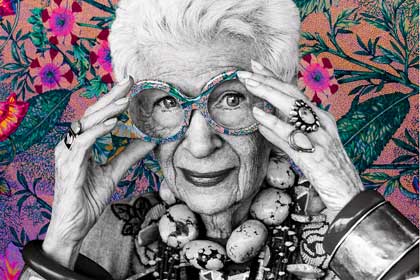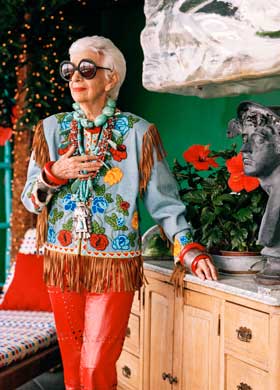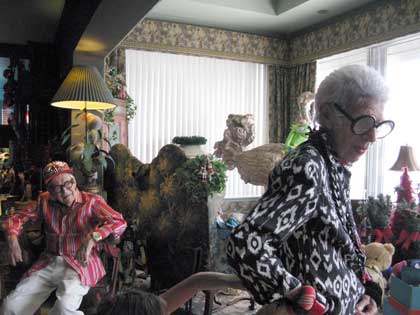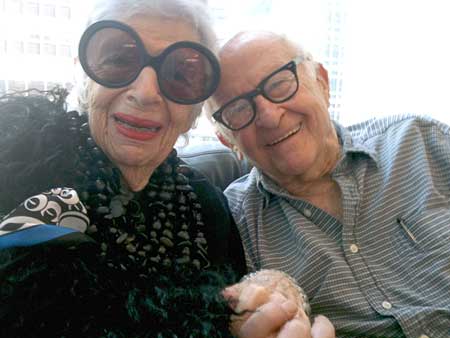Film (2014)
Documentary
Directed by Albert Maysles
Produced by Jennifer Ash Rudick, Laura Coxson, Paul Lovelace, Rebekah Maysles
Film Editing by Paul Lovelace
With Carl Apfel, Iris Apfel
Kendall Square Cinema, Cambridge

in “Iris”
Courtesy of Magnolia Pictures
This absolutely adorable portrait of Iris Apfel is totally captivating, and so well constructed that its artistry does not get in the way of its charming subject. In just under an hour and a half, director Albert Maysles, supported ably by film editor Paul Lovelace, puts together a sequence of scenes that not only captures the features of Iris’ distinctiveness as a fashion personality, but paints her life and character in wonderful detail.
Wearing her signature huge round black rimmed glasses and wonderful arrays of necklaces and bracelets, Iris might be thought of as a fashion clown, but has become, through relentless and daring assertion of her individuality, a fashion icon.
She was featured as one of the famed New York Times fashion photographer’s favorite subjects in the wonderful documentary Bill Cunningham New York (2010), and Cunningham himself shows up briefly here as well. And through exhibitions devoted to her design style and collections of fashion accessories at the Metropolitan Museum of Art in New York, in Palm Beach, and at the Peabody Essex Museum in Salem, Massachusetts, Iris has not only become noted in the fields of design and fashion, but in the public eye as well.

in “Iris”
Photo: © Bruce Weber
Courtesy of Magnolia Pictures
At 90-years-plus during the filming, Iris is completely natural and disarming. The constant entertainment of the film comes not only from her fashion bravado – one can only call it that – but from her wonderful and natural sense of humor. Bons mots flow from her lips at every turn and director Maysles and film editor Lovelace have done a fabulous job of capturing them and weaving them together in a way that seems completely natural as well.
A string of interviews with those who work with and for Iris fills out the portrait of her personal magnetism. Inez Bailey, identified as her “beloved housekeeper,” weighs in with affection, as does photographer Bruce Weber, who acknowledges Iris’ endless energy. “I could feel the pulse around her,” he says. Harold Koda, curator of fashion at the Metropolitan Museum of Art, testifies to Iris’ endless capacity for style, noting that “here was somebody having a great deal of fun.” In reflecting on the show about Iris he curated at the Met, he notes “we didn’t know it would the phenomenon as it was,” acknowledging its draw of significant crowds.

Courtesy of Magnolia Pictures
Fun streams from every pore of this portrait, a testament both to its subject and to the director and editor. One great line follows another. “I’m vertical – so I’m happy,” Iris notes in passing. “It’s better to happy than well dressed,” she offers reflectively. And on style: “I like big and bold and lots of pizzazz. I like color – it can raise the dead. I was very much inflenced my mother who worshipped at the altar of the accessory.” Or “I like to improvise, as though I’m playing jazz, trying this and that.” In passing, commenting on herself: “Another mad outfit!” And on constructing an outfit: “I like individuality, so much is lost these days, so much is homogenized – I hate it. I don’t have any rules because I’d always be breaking them. It’s the process I like much better even than the wearing it.”
Part of her charm is the capacity to be straightforward and be totally honest about herself: “I never felt pretty, I don’t feel pretty now. I don’t like pretty. When you’re somebody like myself, you have to do something, so you become more interesting.”
Central to the warmth of the film and of the portrayal is the depiction of Iris’ very long and devoted marriage to her husband Carl, who, in addition to being extremely proud and supportive of his wife, is hysterically funny as well. With gentle humor and deep affection, Iris reflects on their coming together: “I figured he was cool, cuddly and he cooked Chinese so I couldn’t do any better.” “It’s not a dull marriage, I can tell you that!” he says. “A very talented wife – I think I’ll keep her,” he adds with poignant irony as he approaches his 100th birthday, a scene from the celebration of which is captured in the film.
Iris’ inspiration to hosts of people in and around the fashion industry is apparent at every turn. Whether advising a group of young African-American women on style choices, going accessory shopping in Harlem where, as she puts it “… they have real style. Downtown they all wear black – it’s really a kind of uniform,” or posing for a fashion shoot herself, she radiates an unbridled and independent sense that attracts everyone.

Photo: Courtesy of Magnolia Pictures
One of the embedded appeals of the film is its capacity to capture Iris’ sense of intimacy and informality with Albert Maysles, the film’s octogenarian director. By her calling out at multiple instances to “Albert,” we become aware of the presence of the cinematic eye upon her. Credit goes to Maysles and editor Paul Lovelace for including these moments with subtlety and style. (Sadly, Albert Maysles passed away at the age of 88 on March 5, 2015.)
“Today I am a geriatric starlet,” says Iris, with wonderful self-amusement. And, indeed she is, endlessly youthful, wise, funny and charming, and a completely captivating subject for this endearing and wonderfully constructed documentary.
– BADMan
Leave a Reply